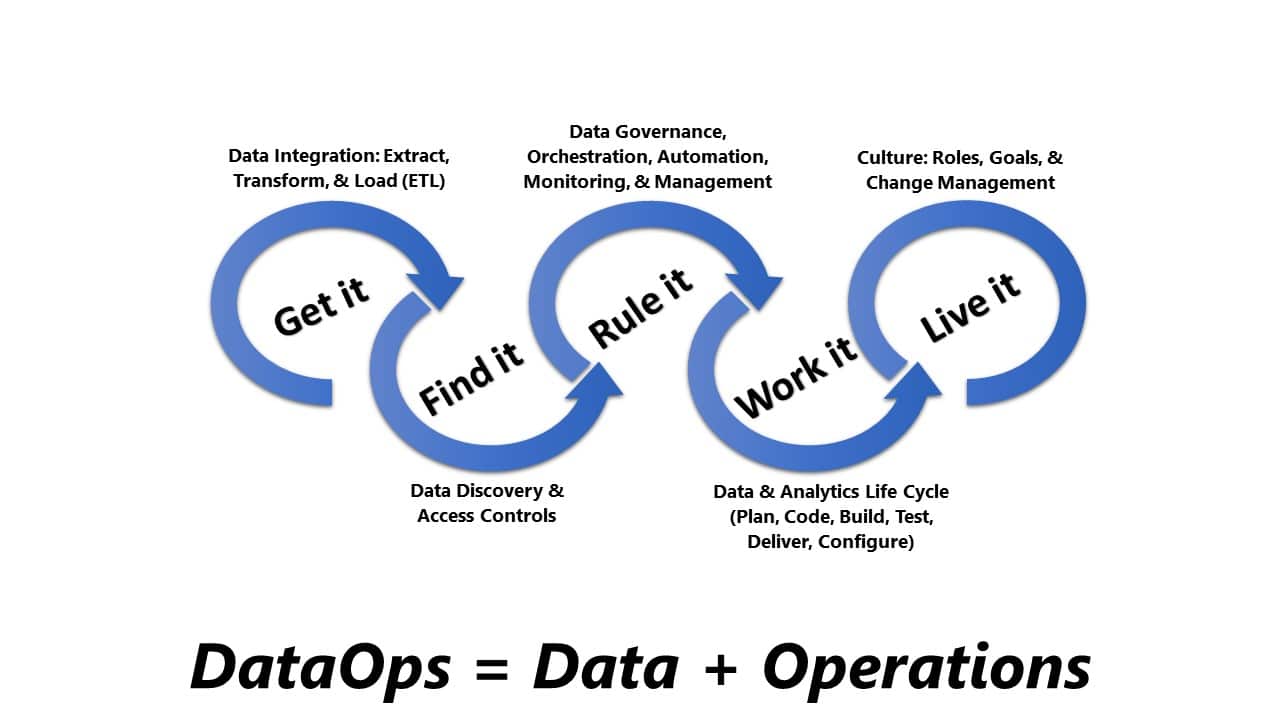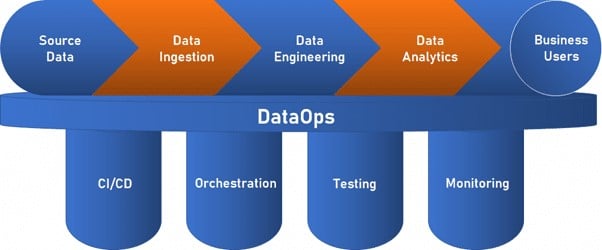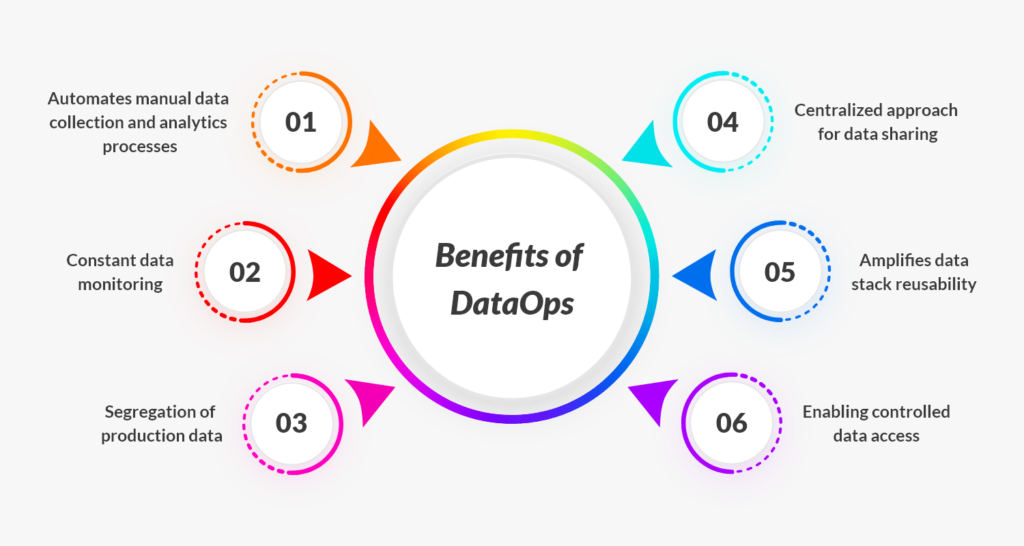Introduction
Welcome to ‘6 Innovative Approaches in DataOps: Revolutionizing Data Management and Delivery,’ a comprehensive exploration into the world of DataOps. This blog delves into how DataOps, a collaborative data management practice, is transforming the way organizations handle and deliver data. We’ll explore the key principles, practices, and benefits of DataOps, highlighting its role in enhancing data quality, streamlining workflows, and fostering a culture of continuous improvement.
Understanding DataOps

DataOps, short for Data Operations, is an emerging discipline that focuses on improving the coordination between data creation, management, and consumption. It’s a collaborative practice that brings together data scientists, engineers, and business professionals to streamline the data lifecycle. The goal of Data Operations is to accelerate the time it takes to derive value from data, ensuring that data is accurate, accessible, and secure.
The Role of DataOps in Modern Business

The role of Data Operations in modern business is becoming increasingly crucial as organizations strive to become more data-driven. In today’s fast-paced business environment, the ability to quickly process and analyze large volumes of data can provide a significant competitive advantage. DataOps facilitates this by enabling more efficient data management and faster data delivery.
1. Agile Methodology in Data Management
- Implementing agile methodologies in data management is a key aspect of Data Operations. This approach involves iterative development, continuous testing, and regular feedback, ensuring that data processes are flexible and responsive to change.
- Agile Data Operations practices help organizations adapt quickly to new data sources, changing business requirements, and evolving market conditions, enabling them to stay ahead in a data-centric world.
2. Automation of Data Processes
- Automation is a cornerstone of Data Operations. It involves using technology to automate repetitive and time-consuming data tasks, such as data extraction, transformation, and loading (ETL).
- Automated data pipelines reduce the likelihood of errors, increase efficiency, and free up data professionals to focus on more strategic tasks, such as data analysis and interpretation.
3. Collaboration Across Teams
- DataOps emphasizes collaboration across different teams – data scientists, engineers, IT professionals, and business analysts. This collaborative approach ensures that everyone works towards a common goal and understands the value of the data being managed.
- Cross-functional collaboration in Data Operations leads to more innovative solutions, faster problem-solving, and a more cohesive data strategy across the organization.
4. Continuous Integration and Delivery in Data
- Continuous integration and delivery (CI/CD) are essential practices in Data Operations. They involve continuously integrating data changes into a central repository and automatically delivering these changes to the production environment.
- CI/CD in Data Operations ensures that data is always up-to-date and available for analysis, helping organizations to make timely and informed decisions.
5. Monitoring and Logging for Data Quality
- Monitoring and logging are critical for maintaining data quality in DataOps. These practices involve tracking data as it moves through pipelines and logging any issues that arise.
- Proactive monitoring and logging help identify and resolve data quality issues quickly, ensuring that the data remains reliable and trustworthy for decision-making.
6. Embracing New Technologies and Tools
- Data Operations is about staying ahead of the curve by embracing new technologies and tools. This includes cloud-based platforms, advanced analytics tools, and machine learning algorithms.
- Leveraging cutting-edge technologies in Data Operations enables organizations to process and analyze data more effectively, uncovering deeper insights and driving innovation.
7. Data Security and Compliance in DataOps
- Ensuring data security and compliance is a critical component of Data Operations. This involves implementing robust security measures and adhering to data protection regulations.
- DataOps frameworks must include strategies for data encryption, access control, and regular compliance audits to safeguard sensitive information and maintain trust.
8. DataOps and the Future of Data Management
- The future of Data Operations lies in its ability to evolve with emerging data trends and technologies. This includes adapting to advancements in AI, IoT, and real-time analytics.
- As data becomes increasingly integral to business operations, Data Operations will continue to be a key driver in managing data more effectively, enabling organizations to harness the full potential of their data assets.
Benefits of Implementing DataOps

- Enhanced Data Quality and Reliability: Data Operations practices lead to improved data quality and reliability, ensuring that decision-makers have access to accurate and timely information.
- Increased Operational Efficiency: By automating and streamlining data processes, Data Operations significantly increase operational efficiency, reducing time-to-insight and accelerating data-driven decision-making.
- Scalability and Flexibility: Data Operations provide a scalable and flexible approach to data management, allowing organizations to easily adapt to changing data volumes and business needs.
- Improved Collaboration and Innovation: The collaborative nature of DataOps fosters a culture of innovation, where diverse teams work together to find creative solutions to data challenges.
- Risk Mitigation and Compliance: Data Operations helps in mitigating risks associated with data management and ensures compliance with various data protection and privacy regulations.
The Future of DataOps
The future of Data Operations is poised to be a transformative force in the landscape of data management and analytics. As organizations continue to navigate the complexities of big data and the need for agile decision-making, DataOps is set to play a pivotal role in shaping how data is handled, processed, and utilized.
- Adaptation to Emerging Technologies: The integration of emerging technologies such as artificial intelligence (AI), machine learning (ML), and the Internet of Things (IoT) into DataOps practices is expected to accelerate. These technologies will enable more sophisticated automation of data processes, from collection to analysis, enhancing the efficiency and accuracy of data operations. For instance, AI and ML can be used to predict data trends and automate data quality checks, while IoT devices will provide a continuous stream of real-time data for immediate analysis and action.
- Real-Time Data Processing and Analytics: The demand for real-time data processing and analytics will drive the evolution of DataOps. Organizations will increasingly require the ability to process and analyze data as it is generated, making real-time insights crucial for immediate decision-making. DataOps will need to facilitate these capabilities by ensuring that data pipelines are capable of handling high-velocity data without compromising on quality or security.
- Enhanced Collaboration and Democratization of Data: DataOps will continue to break down silos between departments, fostering a more collaborative and inclusive data culture within organizations. The democratization of data, where data is made accessible and understandable to non-technical users, will be a key focus. This will involve the development of user-friendly tools and platforms that enable employees across various functions to leverage data insights directly, without relying solely on data teams.
- Focus on Data Governance and Compliance: As data privacy and security concerns continue to grow, Data Operations will increasingly incorporate robust data governance and compliance measures. This will involve not only adhering to existing data protection regulations but also proactively preparing for future legislative changes. DataOps will play a crucial role in ensuring that organizations’ data practices are transparent, secure, and compliant with global standards.
- Scalability and Cloud Integration: The scalability of DataOps will be essential as data volumes continue to expand. Cloud-based DataOps solutions will become more prevalent, offering the scalability, flexibility, and cost-effectiveness needed to manage large datasets. Cloud integration will also facilitate better collaboration and data sharing, both within and between organizations.
Conclusion
DataOps is revolutionizing the way organizations manage and deliver data. By adopting these six innovative approaches, businesses can streamline their data management processes, enhance data quality, and drive more value from their data assets. As the data landscape continues to evolve, Data Operations will play an increasingly important role in helping organizations stay agile, efficient, and competitive in a data-driven world.



